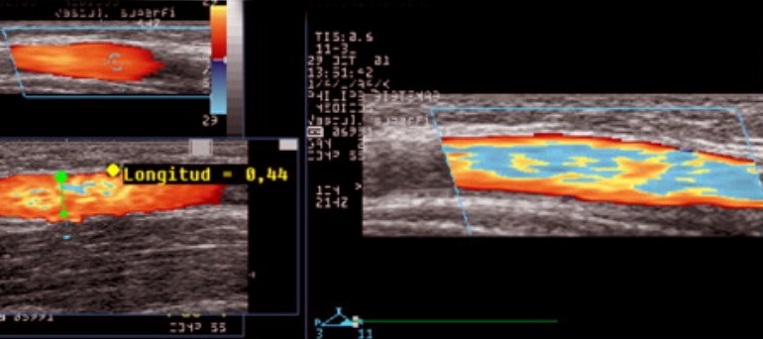Study Finds That Most Post-COVID Individuals Have Significantly Lower Flow-Mediated Dilatation Levels
Nikhil Prasad Fact checked by:Thailand Medical News Team Feb 25, 2025 1 month, 3 weeks, 2 days, 12 hours, 10 minutes ago
Medical News: A new study conducted by researchers from "Victor Babes" University of Medicine and Pharmacy, Timisoara, Romania, has revealed alarming evidence that most individuals who have recovered from COVID-19 exhibit significantly lower flow-mediated dilatation (FMD) levels, indicating persistent endothelial dysfunction. This discovery sheds light on the lingering cardiovascular risks faced by post-COVID-19 patients and underscores the need for long-term monitoring and intervention.
 Study Finds That Most Post-COVID Individuals Have Significantly Lower Flow-Mediated Dilatation Levels
Understanding Flow-Mediated Dilation (FMD)
Study Finds That Most Post-COVID Individuals Have Significantly Lower Flow-Mediated Dilatation Levels
Understanding Flow-Mediated Dilation (FMD)
Flow-mediated dilation (FMD) describes the widening of an artery in response to increased blood flow within it. This process is primarily driven by the release of nitric oxide from endothelial cells, which plays a crucial role in vascular function. FMD is typically assessed by using ultrasound to measure the dilation of the brachial artery after a temporary reduction in forearm blood flow. Since accurate measurement is essential for reliable results, standardized protocols have been developed to minimize inconsistencies and enhance precision. As a noninvasive indicator of vascular health, FMD reflects endothelial function, with lower values suggesting endothelial dysfunction. Research has shown that reduced FMD is at least as effective as conventional risk factors in predicting cardiovascular disease. Conditions strongly associated with poor FMD include myocardial infarction, stroke, and cardiac-related mortality. In individuals with preexisting cardiovascular disease, low FMD is a particularly strong predictor of future adverse events. Additionally, those with atrial fibrillation tend to exhibit diminished FMD levels, though it remains unclear whether this is a contributing factor to the condition or merely a marker linked to an underlying cause.
Endothelial Dysfunction and FMD
The endothelium, a thin layer of cells lining blood vessels, plays a crucial role in regulating vascular health. Endothelial dysfunction, marked by reduced ability of blood vessels to dilate properly, is an early indicator of cardiovascular diseases. One of the key methods used to assess endothelial function is flow-mediated dilatation (FMD), which measures how well blood vessels expand in response to increased blood flow.
Study Overview and Methods
Researchers at "Victor Babes" University of Medicine and Pharmacy conducted a retrospective study involving 198 participants, divided into two equal groups: 99 individuals who had recovered from COVID-19 and 99 individuals with no history of infection. The study aimed to assess the relationship between COVID-19 and endothelial dysfunction using FMD measurements and key inflammatory markers.
To ensure accuracy, the team used a Fujifilm Diagnostic Ultrasound System Arietta 65 to measure the brachial artery's diameter before and after induced blood flow increase. Various inflammatory markers, including erythrocyte sedimentation rate (ESR), fibrinogen, C-reactive protein (CRP), interleukin-6 (IL-6), and the neutrophil-to-lymphocyte ratio (NLR), were also recorded to determine their correlation with endot
helial function. This
Medical News report highlights the significance of these findings.
Key Findings: Post-COVID Individuals Show Lower FMD Levels
The study revealed that post-COVID-19 individuals had significantly lower FMD values compared to those without prior infection (7.72% vs. 13.72%, p<0.0001), indicating substantial endothelial dysfunction. This suggests that the virus exerts a long-lasting impact on vascular health, even after recovery from acute infection.
Additionally, the analysis found strong inverse correlations between FMD levels and multiple inflammatory markers. Specifically:
-ESR levels were significantly elevated in post-COVID individuals (38.06 vs. 16.18, p<0.0001) and showed the strongest inverse correlation with FMD (r=-0.79, p<0.0001), suggesting a prolonged inflammatory response.
-Fibrinogen levels were markedly higher in the post-COVID group (507.71 vs. 337.58, p<0.0001), correlating with increased endothelial dysfunction.
-CRP levels, a known marker of systemic inflammation, were also significantly elevated in post-COVID individuals (48.40 vs. 7.22, p<0.0001), further reinforcing the connection between inflammation and vascular impairment.
-IL-6 levels, which play a central role in immune response, were found to be elevated in post-COVID individuals and inversely associated with FMD, highlighting the persistent inflammatory state.
-NLR values, another indicator of systemic inflammation, were significantly higher in post-COVID patients (4.74 vs. 3.14, p=0.0038), further supporting the link between inflammation and impaired vascular function.
Implications of the Study
These findings underscore the need for ongoing cardiovascular monitoring in post-COVID patients. The persistent endothelial dysfunction observed in these individuals suggests a heightened risk for long-term cardiovascular complications, including hypertension, atherosclerosis, and increased risk of stroke or heart attack.
Potential Interventions
Given these results, researchers emphasize the importance of preventive measures and early interventions to mitigate cardiovascular risks. Suggested strategies include:
-Anti-inflammatory therapies: Drugs targeting inflammatory pathways, such as IL-6 inhibitors and corticosteroids, may help reduce vascular inflammation.
-Lifestyle modifications: A healthy diet rich in antioxidants, regular exercise, and smoking cessation can aid in improving endothelial function.
-Pharmacological approaches: Statins and angiotensin-converting enzyme (ACE) inhibitors have been shown to improve endothelial health and may be beneficial for post-COVID patients.
-Regular cardiovascular check-ups: Post-COVID patients should undergo routine vascular assessments to detect early signs of dysfunction and implement timely interventions.
Conclusion
The study confirms that COVID-19 has long-lasting effects on vascular health, with post-COVID individuals displaying significantly lower FMD levels and persistent endothelial dysfunction. The strong correlation between inflammatory markers and FMD highlights the need for continued monitoring and management of cardiovascular health in post-recovery patients.
As COVID-19 continues to affect millions worldwide, understanding its long-term impacts remains critical. Future research should focus on developing targeted therapies to restore endothelial function and minimize cardiovascular risks in post-COVID individuals.
The study findings were published in the peer-reviewed journal: Viruses.
https://www.mdpi.com/1999-4915/17/3/305
For the latest COVID-19 News, keep on logging to Thailand
Medical News.
Read Also:
https://www.thailandmedical.news/news/american-study-alarmingly-finds-that-non-hospitalized-long-covid-patients-show-reduced-retinal-blood-flow
https://www.thailandmedical.news/news/covid-19-damages-human-blood-vessels
https://www.thailandmedical.news/news/researchers-in-belgium-find-that-most-with-long-covid-exhibit-hypercoagulability-and-endothelial-dysfunction
https://www.thailandmedical.news/articles/coronavirus
https://www.thailandmedical.news/articles/long-covid
https://www.thailandmedical.news/pages/thailand_doctors_listings
